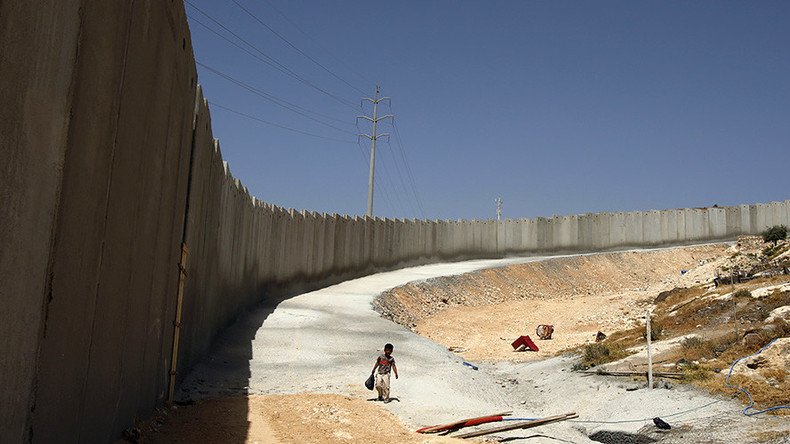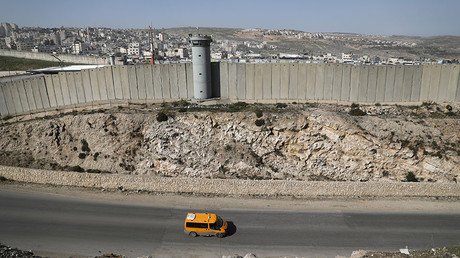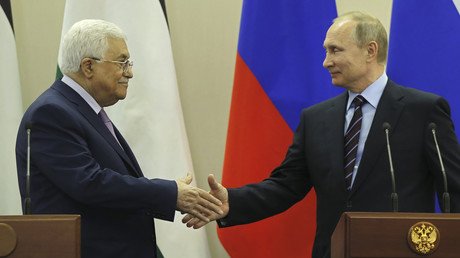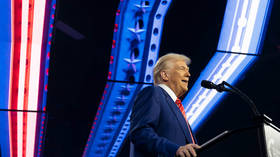State Dept. distances itself from ambassador saying Israel occupies mere ‘2% of West Bank’

The US still supports a two-state solution to the Israeli-Palestinian conflict, the State Department has emphasized, distancing itself from claims by its Ambassador to Israel that the approach has “lost its meaning” and that settlements are an integral part of Israel.
The two-state solution has been the backbone of a potential Israeli-Palestinian settlement and aims to forge an independent State of Palestine alongside the State of Israel.
As the boundaries between the two states are yet to be determined, Palestinians insist on drawing the demarcation lines along the 1967 borders with East Jerusalem serving as the new state’s capital – preconditions Israel has dismissed.
Donald Trump’s administration has taken a more favorable approach to Israeli claims on Palestinian lands. Trump has indirectly endorsed the construction of Israeli settlements and has even hinted that Washington might consider moving its embassy from Tel Aviv to Jerusalem; foreign policy moves that might impede the realisation of a two-state solution.
Washington’s bidding in the region is now being handled by US Ambassador to Israel David Friedman, a Jew who was appointed by Trump earlier this year.
@USAmbIsrael Friedman tells @wallanews: @realDonaldTrump will make good on his promise to move embassy to Jerusalem https://t.co/Xie14IgBLC
— יעקב אילון (@JacobEilon) September 28, 2017
On Thursday, Friedman courted controversy, telling Walla news that the two-state solution “has lost its meaning, or at least has a different meaning for different people,” forcing the US State Department to somewhat distance itself from its envoy’s remarks.
The US diplomat added that a new American Israeli-Palestinian peace plan will be presented in the coming months, and that Trump, “at some point during his presidency will recognize Jerusalem as the capital of Israel.”
"הממשל יציג את תכנית השלום בתוך כמה חודשים": שגריר ארה"ב @USAmbIsrael בריאיון בלעדי לוואלה!TALK עם @JacobEilonhttps://t.co/rrVjKz1zbApic.twitter.com/WzZ2RozleO
— וואלה! חדשות (@WallaNews) September 28, 2017
Friedman went on to justify Israeli expansion in the West Bank by saying that Israel occupies a mere “2 percent” of Palestinian territory which has “important” nationalistic, historical and religious significance to Israel.
“So there was always supposed to be some notion of expansion into the West Bank, but not necessarily expansion into the entire West Bank. And I think that’s exactly what, you know, Israel has done. I mean, they’re only occupying 2 percent of the West Bank,” Friedman told Walla.
@USAmbIsrael Friedman tells @JacobEilon@realDonaldTrump is the only one calling the shots in the middle east deal https://t.co/Xie14IgBLC
— יעקב אילון (@JacobEilon) September 28, 2017
The US ambassador appeared to have been misinformed about Israeli activities in West Bank, as Israel occupies around 60 percent of the West Bank including settlements and closed military areas.
“I think the settlements are part of Israel,” Friedman stressed. “I think that was always the expectation when Resolution 242 was adopted in 1967. It remains today the only substantive resolution that was agreed to by everybody.”
UN Resolution 242, adopted in the aftermath of the Six-Day War, called for Israel to withdraw from the territories it occupied in 1967 in exchange for security guarantees with Arab neighbors.
The resolution asks for the “withdrawal of Israeli armed forces from territories occupied” and calls for an acknowledgment of the “sovereignty, territorial integrity and political independence of every State in the area.”
Friedman, however, seemed to have misinterpreted the meaning of the resolution, saying the “idea was that Israel would be entitled to secure borders.”
“The existing borders, the 1967 borders, were viewed by everybody as not secure, so Israel would retain a meaningful portion of the West Bank, and it would return that which it didn’t need for peace and security,” the US ambassador said, as cited by JTA.
The illegal construction of Israeli settlements on Palestinian lands serves as the major obstacle to a peaceful two-state settlement of the decade's long conflict.
In December 2016, the UN Security Council passed a resolution demanding an end to the construction of Israeli settlements on occupied Palestinian land.
On Friday, the State Department distanced itself from Friedman’s comments, emphasizing that Washington still wants to pursue a two-state solution.
“His comments – and I want to be crystal clear about this – should not be read as a way to prejudge the outcome of any negotiations that the US would have with the Israelis and the Palestinians,”said spokeswoman Heather Nauert. “It should also not indicate a shift in US policy.”
“I don’t know where that came from,” Nauert said about Friedman’s ‘2 percent’ assessment.
Nauert underlined that the Israeli-Palestinian conflict remains a priority for the Trump administration. Peace talks have stalled since US efforts collapsed in the spring of 2014.
The two sides also broke contacts after Palestinian President Mahmoud Abbas and his Fatah movement, which controls the West Bank, forged an unexpected pact with Hamas on the governance of the Gaza Strip earlier this month.
Israel sees Hamas as a terrorist organization which aims for the ultimate destruction of the Israeli state. However, without a unified Palestinian front, it is impossible to hold negotiations with Tel Aviv.














